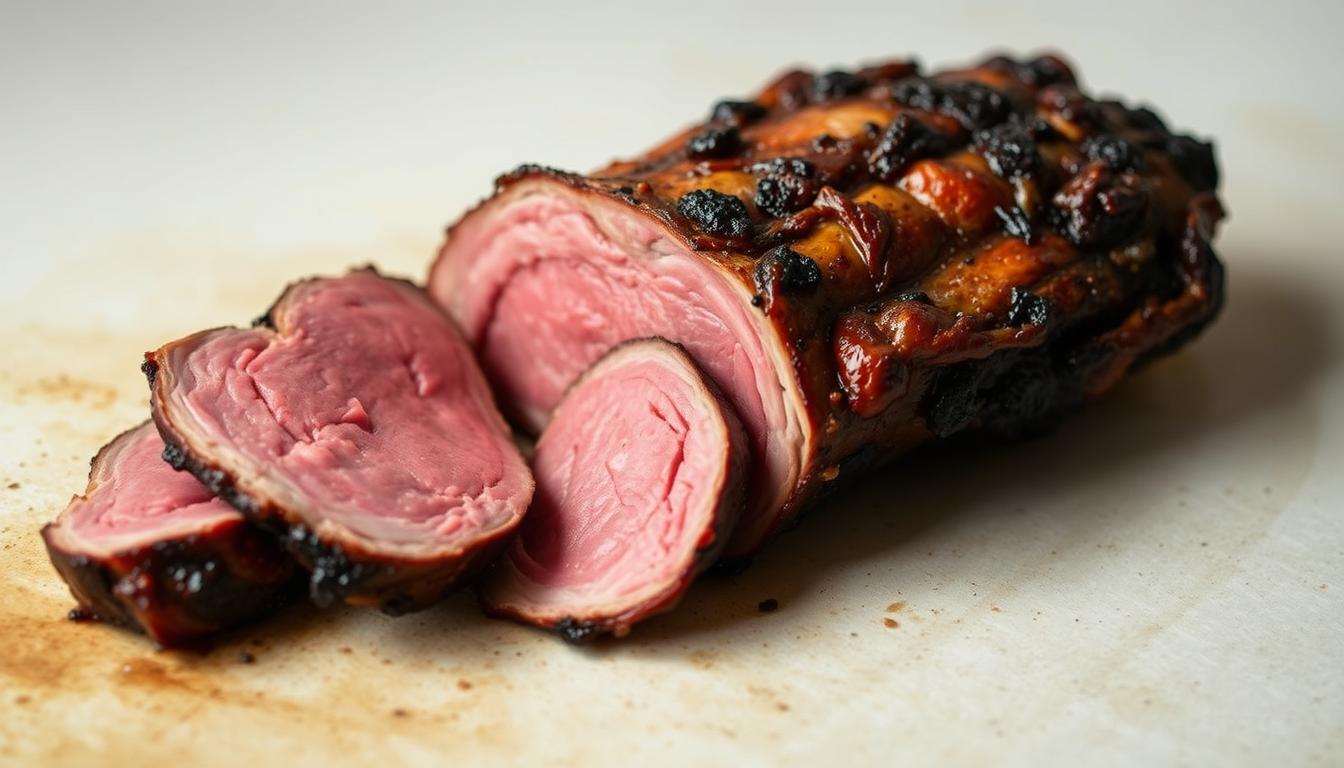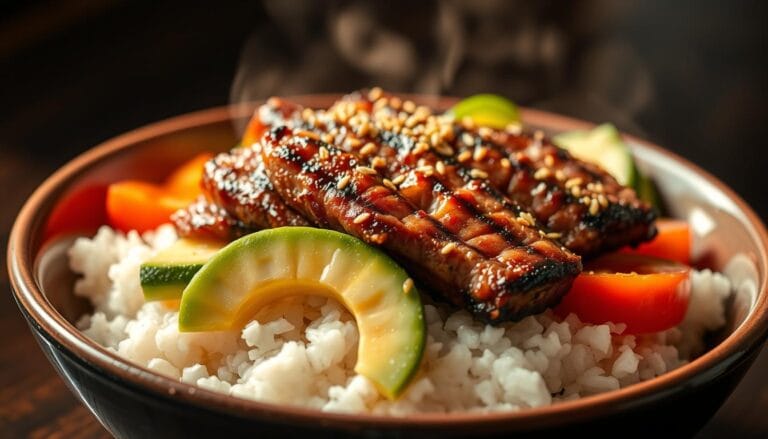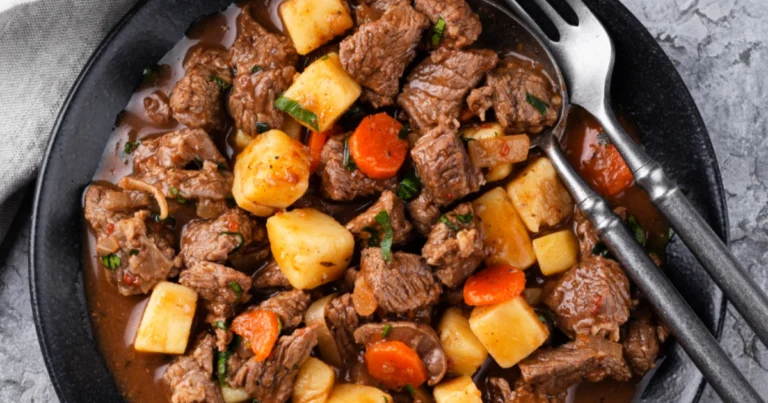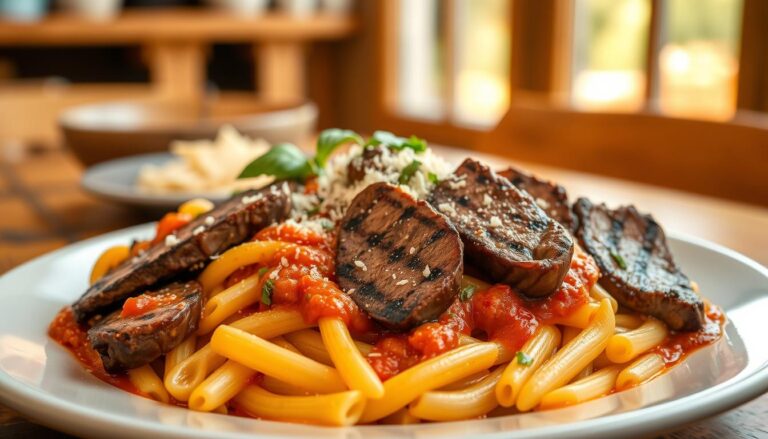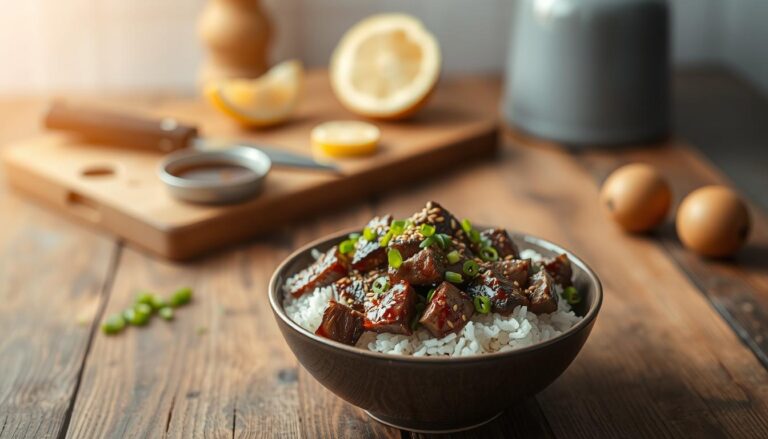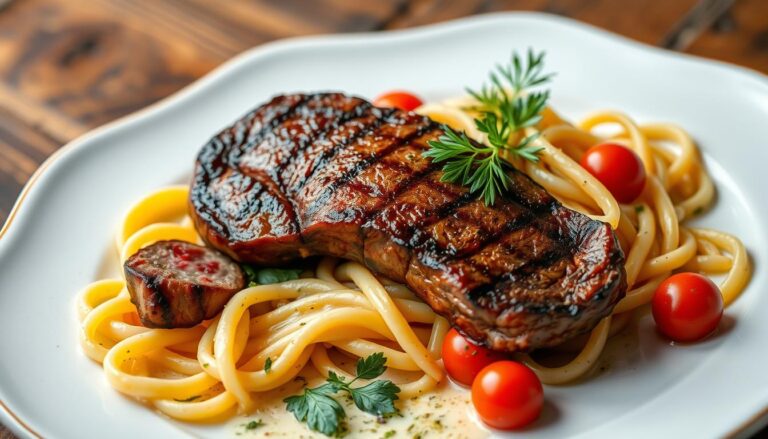How to Cook a Perfect Tri-Tip Roast in the Oven
The smell of a perfectly cooked tri-tip roast can make any dinner special. I remember the first time I cooked it right, turning a tough dinner into a tender, flavorful meal. My family loved it so much, they asked for seconds.
Cooking a tri-tip roast might seem hard, but it’s easy with the right techniques. This guide will show you how to make a delicious tri-tip roast that will impress everyone.
Whether you’re an experienced cook or new to the kitchen, our guide will help you cook perfect tri-tip roast every time. You’ll learn how to pick the right cut and cook it to the perfect temperature. This way, you’ll get juicy, flavorful meat that’s cooked just right.
Get ready to improve your cooking and see why tri-tip roast is loved by many. With a few simple steps, you’ll make a main course that will wow your guests. They’ll all want your recipe.
Table of Contents
What is Tri-Tip Roast?
The tri-tip steak is a special cut of beef that’s loved by many. It’s a triangular muscle from the bottom sirloin. This cut is a hidden treasure in the world of beef, offering great taste at a good price.
The tri-tip roast comes from a specific part of the cow. It’s known for its unique shape and amazing flavor. Unlike other beef cuts, tri-tip is quite rare, with only two cuts per animal.
Understanding the Cut of Meat
The tri-tip steak comes from the tensor fasciae latae muscle at the bottom of the sirloin. Here are some key characteristics:
- Typically weighs between 2-3 pounds
- Features low connective tissue
- Comparable in tenderness to strip steak
- More affordable than premium cuts like ribeye
Flavor Profile and Characteristics
Tri-tip recipes can really stand out by knowing its special traits. This cut has a rich, beefy taste and is juicy thanks to its marbling. It’s lean, making it a great choice for those who want flavor without the heaviness.
“Until the 1950s, tri-tip was primarily used for ground beef, but now it’s a celebrated cut in culinary circles.” – Beef Cooking Traditions
Cooking a tri-tip steak needs careful attention to temperature and technique. The best cooking temperatures are between 130°F and 145°F. Most chefs prefer it rare to medium to keep it tender and flavorful.
| Doneness Level | Temperature Range |
|---|---|
| Rare | 120°F – 130°F |
| Medium Rare | 130°F – 135°F |
| Medium | 135°F – 145°F |
Whether you’re an experienced chef or just starting with tri-tip recipes, knowing its special traits will help you make unforgettable meals.
Preparing Your Tri-Tip Roast
Preparing a delicious tri-tip roast needs careful steps and the right tools. The quality of your meat and tools greatly affects your dish. Here are the key steps for preparing your tri-tip roast with expert tips.
Selecting Quality Meat
When picking a tri-tip roast, look for these important traits:
- Consistent marbling throughout the meat
- Bright red color with minimal brown spots
- Firm texture without excessive moisture
- Weight between 2-3 pounds for optimal cooking
Essential Tools and Ingredients
Get ready for your tri tip marinade and cooking with these tools:
| Category | Recommended Items |
|---|---|
| Cooking Equipment | Cast-iron skillet, meat thermometer, roasting pan |
| Preparation Tools | Sharp knife, cutting board, mixing bowls |
| Seasoning Essentials | Kosher salt, black pepper, olive oil |
Pro tip: Take your tri-tip out of the fridge 20 to 30 minutes before cooking. This helps it cook evenly and taste better.
“The secret to a perfect tri-tip is in the preparation and selection of quality ingredients.”
By following these tips, you’ll make a memorable and tasty meal. It will surely impress your family and friends.
Seasoning Your Tri-Tip Roast
Turning a good tri tip recipe into a great meal starts with seasoning. The right mix of spices and marinades can make your roast stand out. It brings out the rich, beefy flavors that make tri-tip so loved.
Seasoning is an art that can make or break your tri tip marinade. Professional chefs know that the right seasoning brings out the meat’s natural taste. It does this without overpowering its delicate flavor.
Crafting the Perfect Dry Rub
A classic dry rub can elevate your tri tip recipe with little effort. Here’s a foolproof mix that always impresses:
- 2 tablespoons kosher salt
- 1 tablespoon black pepper
- 1 teaspoon garlic powder
- 1 teaspoon onion powder
- 1/2 teaspoon smoked paprika
- 1/4 teaspoon cayenne pepper
Marinade Magic for Flavor Boosters
For a tri tip marinade, keep it simple. A basic marinade can include:
- 1/4 cup olive oil
- 2 tablespoons Worcestershire sauce
- 3 minced garlic cloves
- Fresh rosemary sprigs
- Cracked black pepper
“The key to an incredible tri-tip is letting the marinade work its magic for at least 2-4 hours before cooking.” – Culinary Experts
Seasoning Pro Tips
For the best flavor, apply your dry rub or marinade 30-40 minutes before cooking. This lets the seasonings soak into the meat. It creates a more complex and rich taste.
| Seasoning Type | Prep Time | Flavor Intensity |
|---|---|---|
| Dry Rub | 5 minutes | Medium |
| Liquid Marinade | 4 hours | High |
Remember, great seasoning is about balance. Your goal is to enhance, not mask, the tri-tip’s natural beef flavor.
Cooking Methods for Tri-Tip Roast
Learning how to cook a tri-tip roast is key to a tasty meal. Each cooking method adds its own flavor and texture. Whether you’re cooking at home or grilling, mastering tri-tip cooking will boost your skills.
Oven Roasting Techniques
Oven roasting lets you control the temperature for a perfect tri-tip. First, heat your oven to 425 degrees Fahrenheit. To get a golden crust and a juicy inside, follow these steps.
- Preheat cast iron skillet to 400°F
- Sear meat for 2-3 minutes on each side
- Transfer to oven and cook 10-12 minutes per pound
Slow Cooking and Sous Vide Methods
Slow cooking and sous vide offer special benefits for tri-tip. These methods make the meat tender and full of flavor.
| Cooking Method | Temperature | Cooking Time |
|---|---|---|
| Slow Cooker | 225°F | 30 minutes per pound |
| Sous Vide | 130-135°F | 1-4 hours |
Grilling Options
Grilling gives tri-tip a smoky taste. It’s all about managing heat and timing for the best results.
“Grilling tri-tip is an art that balances high heat and careful attention.” – Culinary Expert
- Preheat grill to medium-high heat
- Sear for 2-3 minutes per side
- Move to indirect heat to finish cooking
After cooking, let your tri-tip rest for 10 minutes. This helps the juices spread evenly, making it moist and flavorful.
How to Sear the Tri-Tip Roast
Searing is key to making your tri tip cooking outstanding. It creates a delicious crust that keeps flavors locked in. This makes every bite a treat.
Benefits of Searing
Searing a tri-tip roast opens up a world of flavors. The high heat starts the Maillard reaction. This reaction makes the meat taste rich and savory.
- Develops a beautiful golden-brown exterior
- Concentrates meat flavors
- Creates appetizing visual appeal
- Helps seal in natural meat juices
Step-by-Step Searing Guide
Here are some tips for perfect searing:
- Select a heavy-bottomed cast-iron skillet
- Heat pan until it’s smoking hot
- Add high smoke-point oil like avocado or grapeseed
- Place tri-tip carefully in pan
- Sear for 30-60 seconds per side
| Searing Parameter | Recommended Value |
|---|---|
| Pan Temperature | 450-500°F |
| Searing Time per Side | 30-60 seconds |
| Recommended Oil | Avocado or Grapeseed |
“Searing is about creating flavor, not cooking the meat through entirely.” – Professional Chef
When cooking tri tip roast, be patient during searing. Aim for a beautiful caramelized exterior. This ensures every bite is full of flavor.
Cooking Temperature and Time
Getting the perfect tri tip cooking temperature is key to a tasty roast. Knowing the right cooking time and internal temperature is essential. It will make your meal a hit every time.
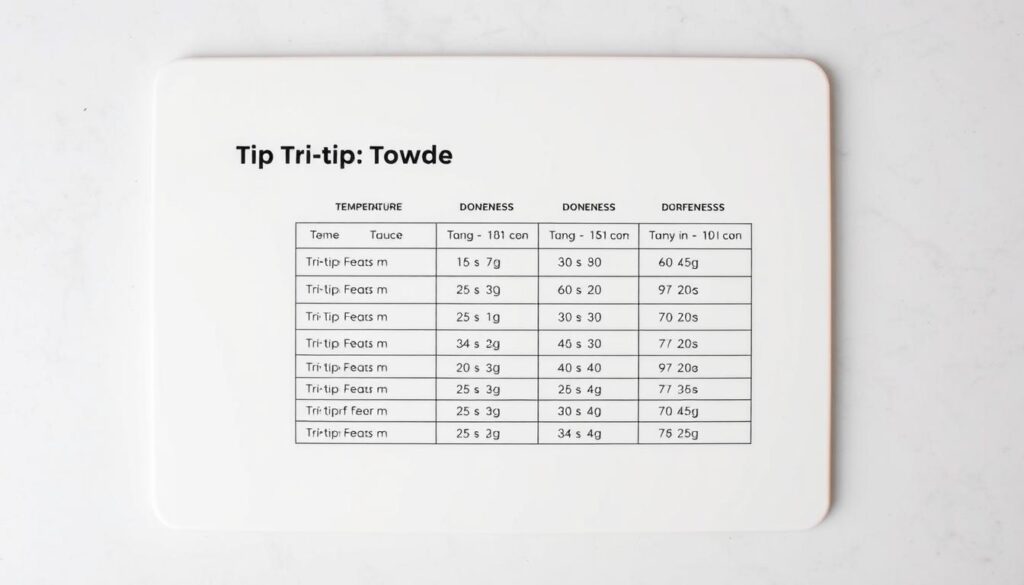
Your first step in tri tip cooking tips is to control the temperature precisely. This ensures a tender and flavorful dish that will wow everyone.
Recommended Internal Temperatures
Different doneness levels need specific internal temperatures. Here’s a guide to help you get the perfect result:
- Rare: 115°F – Bright red center
- Medium-Rare: 125°F – Warm red center
- Medium: 135°F – Warm pink center
- Medium-Well: 145°F – Slightly pink center
- Well-Done: 160°F – Little to no pink
Cooking Time Estimates
Cooking time changes with the roast’s weight and desired doneness. Here’s a useful guide:
| Roast Weight | Cooking Time | Temperature |
|---|---|---|
| 2-3 pounds | 25-35 minutes | 425°F |
| 1.5 pounds | 20-25 minutes | 375°F |
“The key to a perfect tri-tip is patience and a reliable meat thermometer.” – Professional Chef
Pro tip: Always let your tri-tip rest for 5-10 minutes after cooking. This lets the juices spread, making the roast moist and flavorful.
Resting Your Tri-Tip Roast
Cooking a perfect tri tip roast is more than just the prep and cooking. It’s also about what happens after you take it off the heat. Resting is a key step that can turn a dry, tough piece of meat into a juicy, tender one.
When you cook a tri tip roast, the meat’s juices get very active. Taking the roast off the heat and letting it rest helps these juices spread out evenly. This makes sure each slice is moist and full of flavor.
The Science Behind Resting Meat
Heat during cooking makes meat proteins contract, pushing moisture to the center. Resting lets these proteins relax and soak up the juices again. This makes the meat more tender to eat.
Ideal Resting Time and Technique
- Rest your tri-tip for 10-15 minutes after cooking
- Loosely tent the meat with aluminum foil
- Place the roast on a cutting board away from direct heat
“Patience is key when resting meat—it transforms a good roast into an exceptional meal.”
Your tri tip roast will keep cooking a bit while it rests, with the inside temperature going up by 5-10 degrees. This ensures a perfectly cooked, juicy roast that will wow any meat lover.
| Roast Weight | Recommended Resting Time | Temperature Rise |
|---|---|---|
| 2 lbs | 10-15 minutes | 5-10°F |
| 3 lbs | 15-20 minutes | 8-12°F |
By following these tips, you’ll improve your cooking skills and serve a top-notch meal at home.
Slicing the Tri-Tip Roast
Learning to slice your tri tip recipe right is key to a tender and tasty meal. The way you cut it can greatly affect how it tastes.
Tri-tip cooking tips show that this cut has a special grain pattern. This pattern changes direction, making the right slicing technique very important. Knowing how to slice ensures your meat stays tender and full of flavor.
Best Techniques for Slicing
To get the perfect slice, follow these steps:
- Identify the grain direction before cutting
- Use a sharp knife for clean cuts
- Slice against the grain perpendicular to muscle fibers
- Cut into approximately 1/4-inch thick slices
Serving Suggestions
Your tri tip recipe should look as good as it tastes. Here are some serving tips:
- Arrange slices on a warm platter
- Garnish with fresh herbs
- Serve immediately after slicing
| Slice Thickness | Recommended Result |
|---|---|
| 1/4 inch | Tender, easy-to-eat slices |
| 1/2 inch | Thicker, more substantial cut |
“The secret to a perfect tri-tip is all in the slice!” – California BBQ Master
Pro tip: Always let your roast rest for 10 minutes before slicing. This ensures it stays juicy and flavorful.
Pairing Side Dishes
Choosing the right side dishes can make your tri tip recipe amazing. The perfect sides will enhance the flavors of your roast. This will make your meal unforgettable.
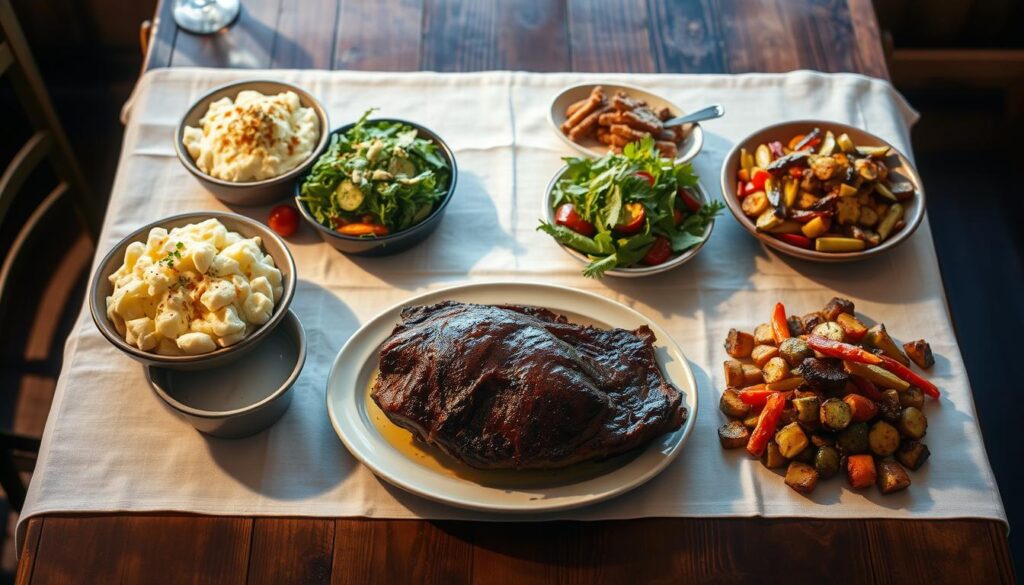
Think about different side dishes with various textures and tastes. You want a balanced plate that shows off your tri-tip.
Classic Side Dish Hits
Some classic sides that go great with tri-tip are:
- Garlic Mashed Potatoes
- Roasted Vegetables
- Corn on the Cob
- Baked Beans
- Mac and Cheese
Fresh Salads and Vegetables
| Side Dish | Preparation Time | Flavor Profile |
|---|---|---|
| Caesar Salad | 15 minutes | Tangy and Crisp |
| Grilled Asparagus | 20 minutes | Savory and Fresh |
| Coleslaw | 25 minutes | Creamy and Crunchy |
Pro tip: Prepare side dishes while your tri-tip rests. This way, everything will be warm and ready at the same time.
“The right side dish can transform a good meal into an unforgettable culinary experience.” – Culinary Expert
Your tri tip recipe needs sides that match its taste and elegance. Try different combinations to impress your guests.
Storing Leftover Tri-Tip Roast
Enjoying a delicious tri tip roast is just the beginning. Knowing how to store and reuse leftovers can make your meal last longer. It’s important to store food right to keep flavors and prevent sickness.
Best Practices for Refrigeration
Start with keeping the temperature right. Cooked tri-tip needs to be in the fridge within two hours. Here’s how to keep it fresh:
- Store in an airtight container
- Refrigerate at temperatures below 40°F
- Consume within 3-4 days
Preservation and Freezing Techniques
Freezing leftover tri-tip is a great way to keep it good. Follow these tips to freeze it right:
| Storage Method | Duration | Recommended Technique |
|---|---|---|
| Refrigeration | 3-4 days | Airtight container |
| Freezing | Up to 6 months | Vacuum sealer recommended |
Creative Leftover Ideas
Turn leftover tri-tip into new dishes:
- Tri-tip tacos with fresh salsa
- Sliced beef salad
- Stir-fry with vegetables
- Beef sandwiches
“Leftover tri-tip is an opportunity for culinary creativity!” – Professional Chef
Reheating tips: Warm in the oven at 250°F for 20-30 minutes. Add beef broth to keep it moist. For a crispy outside, quickly sear for 30 seconds on each side.
Common Mistakes to Avoid
Mastering tri tip cooking tips means knowing what can go wrong. A simple mistake can turn your roast into a tough, dry mess. It’s important to avoid common errors that even seasoned chefs can make.
Cooking a perfect tri-tip roast is more than just following a recipe. It’s about precision and paying close attention to every detail. This ensures your dish is not only delicious but also perfectly cooked.
Overcooking Pitfalls
Overcooking is the biggest mistake when cooking tri-tip. The meat can quickly become tough and lose its juiciness. To avoid this:
- Always use a meat thermometer to monitor internal temperature
- Remove the roast when it reaches 120-125°F for medium-rare
- Allow 5-10 minutes of resting time for carryover cooking
Seasoning Errors to Dodge
Seasoning is crucial for your tri-tip roast. Here’s how to do it right:
- Use a proper salt ratio of 1% to the meat’s weight
- Create a balanced dry rub with salt, pepper, garlic, and onion powder
- Avoid over-salting, which can make the meat too intense
“The secret to a perfect tri-tip is respecting the meat’s natural flavors while enhancing them subtly.” – Chef Douglas Keane
Remember, cooking temperatures are key. Aim for 135°F for medium-rare, 145°F for medium, and 170°F for well-done. By avoiding these common mistakes, you’ll make your tri-tip truly exceptional.
Final Thoughts on Tri-Tip Roast
Your journey to mastering the perfect tri-tip recipe has given you key tips. These tips turn a simple meal into a special dining experience. With practice, you’ll learn to make a tender, flavorful roast that’s as good as steakhouse quality.
Brisket-style tri-tip is almost as good as traditional brisket, which is 98%. This makes it a great choice for home cooks. By controlling temperature and using the right cooking techniques, you can improve your cooking skills. Remember, cooking to 200°F ensures a tender, tasty cut that will wow your family and guests.
As you keep trying different tri-tip recipes, don’t be afraid to experiment with seasonings, cooking methods, and serving styles. Each time you cook, you get better and more confident in the kitchen. Your openness to learning and trying new things will lead to delicious tri-tip roasts that show off your growing cooking skills.
Celebrating Your Culinary Success
Every perfectly cooked tri-tip is a big win in your cooking journey. By mastering this versatile cut, you’ve added to your cooking skills and knowledge. Enjoy the journey, relish the results, and be proud of your growing cooking abilities.
Encouragement to Experiment
The world of tri-tip offers endless possibilities. Whether you like grilling, oven roasting, or sous vide, keep exploring and improving your methods. Your love for cooking will make every meal unforgettable.

